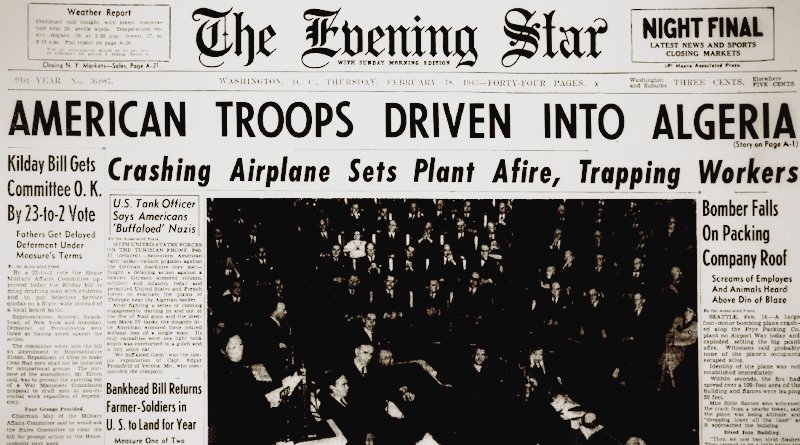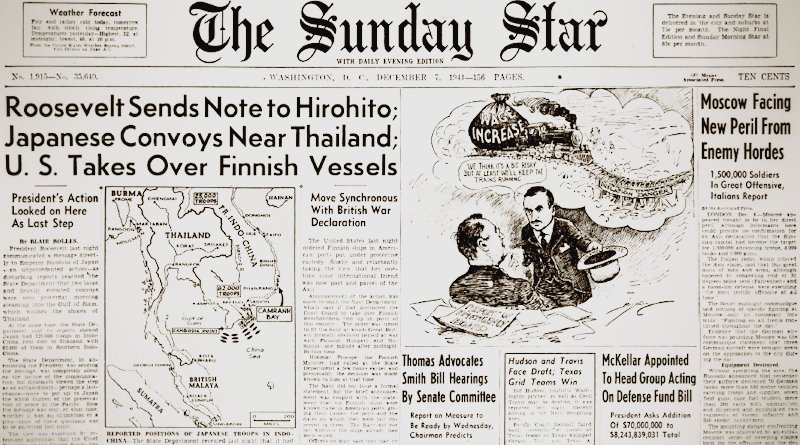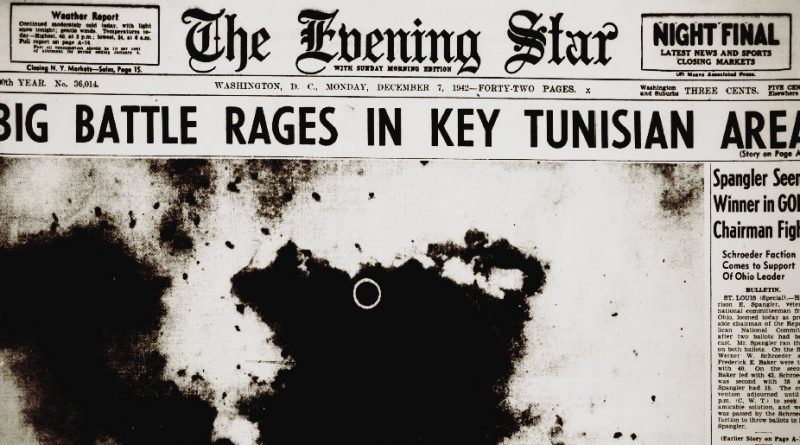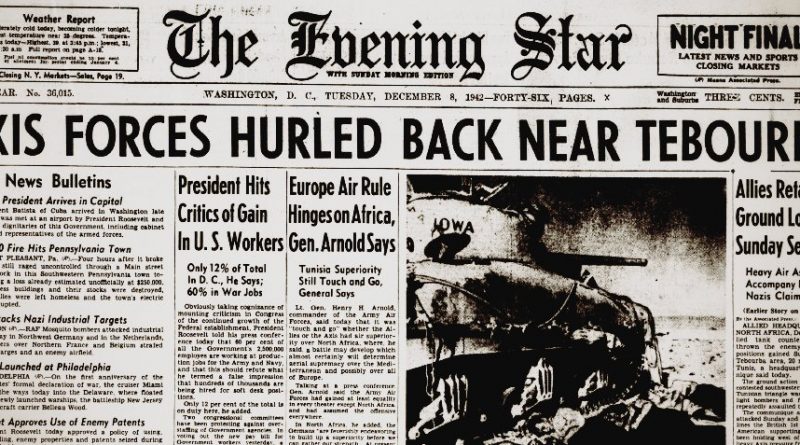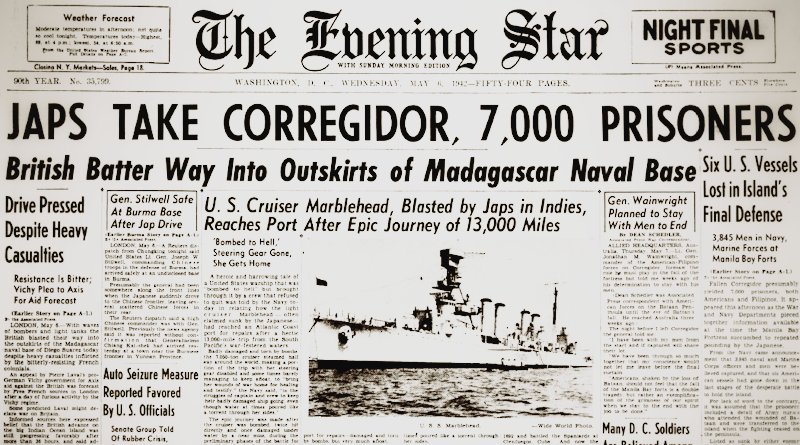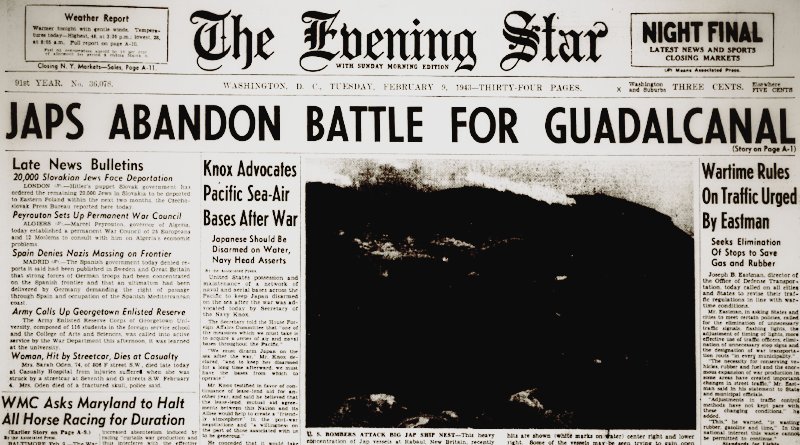World War II Chronicle: February 18, 1943
The front page reports that a “four-engine bomber” has crashed into a Seattle meat-packing plant. Boeing’s test pilot extraordinaire Eddie Allen was at the controls of a massive prototype when it one of its engines caught fire shortly after takeoff. The plane’s fire extinguishing system put out the engine, but a second fire lit off, causing an explosion on the wing that crippled the plane as it was preparing to land at Boeing Field. Three crew members bailed, but their parachutes could not open in time. The rest were killed when the bomber smashed into the plant.
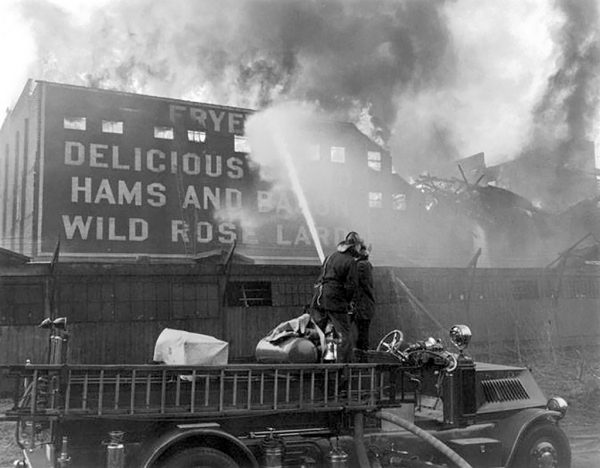
20 plant workers perished in the blaze, along with one firefighter. A group of soldiers who also boxed happened to be nearby when the plane crashed, on their way to a weigh-in for an upcoming fight. Sam Morris was one of the soldiers and he carried several victims to safety and caught two more who jumped. First Lady Eleanor Roosevelt will personally award him and his comrades the Soldier’s Medal for their life-saving efforts.
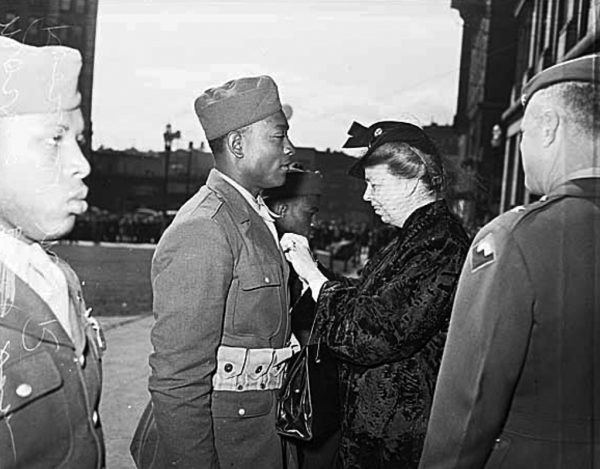
This was the second time Allen experienced an engine fire in this plane: it’s maiden voyage in December was cut short when it developed an engine fire. War censors won’t disclose the type of bomber, but you may have already figured out it is the cutting-edge XB-29 Superfortress… Another deadly crash near Tucson kills six of 34 passengers and crew. The air frame survives, however and this Consolidated B-24D will be modified to become a C-87 Liberator Express prototype named Pinocchio… Still on the front page, another crash of a PBM Mariner claimed the lives of seven Naval airmen off the coast of Norfolk.
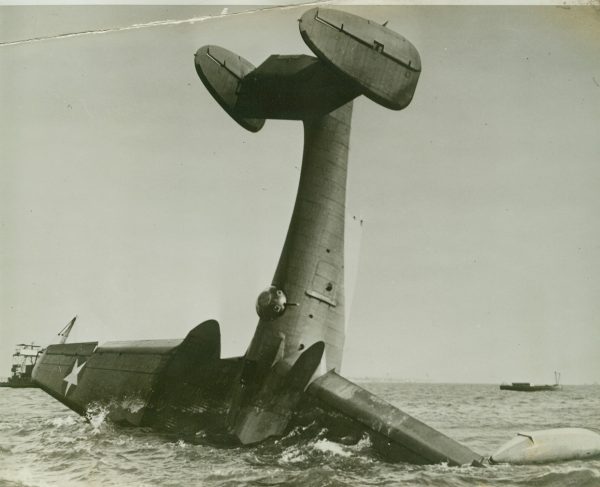
Another 12 men perished in a B-17F crash in South Dakota (see page 15). They belonged to the 335th Bombing Squadron, which is about to join the Eighth Air Force and begin combat operations in May. Probably not a day has gone by since the Chronicle began in January 1941 when there hasn’t been a mention of a fatal air accident. It’s remarkable how many men lost their lives and how many planes were destroyed in training alone…
On page three: Frank “Rube” Melton, Brooklyn’s 6’5″ hard-throwing right hander, is holding out and says he plans to retire. He was the “Wild Thing” of the 1940s, leading the league in walks and wild pitches in 1942. His 20 losses with Philadelphia was second-only to the Boston Braves’ Jim Tobin. Melton ends up signing with Dodger general manager Branch Rickey, whom he played for in the St. Louis Cardinal farm system. Rickey was happy to get Menton back, and says he “can throw a ball as hard as any man living.” His cousin Cliff is just as tall as Frank and made the All-Star game last season playing for the Giants…
The battleship USS Iowa is preparing to join the fleet and its capabilities are discussed on page four… Adm. William “Bull” Halsey has pinned his own stars on newly promoted Lt. Gen. Millard Harmon (see page six), the commanding general of Army Forces in the South Pacific Area… George Fielding Eliot column on page 12… Sports section is on page 21, and reports that Connie Mack’s Philadelphia Athletics are about to be sold to the National League. His club is flat broke, but they did have a buyer ready to pay last year. Problem was, Leon Levy was Jewish, so the sale didn’t go through. Color apparently wasn’t the only barrier in Major League Baseball…
Speaking of Jews, Staff Sgt. Meyer Levin has been killed in the Pacific. Levin was a hero to Jewish Americans, having served as Capt. Collin Kelley’s bombardier in the early days of the war…
Roving Reporter by Ernie Pyle
AT THE FRONT IN TUNISIA — (By Wireless) — The jeep in which I was riding almost at the tail end of our immense armored convoy when we started, but before many hours had passed we had overtaken so many slow-moving vehicles that we worked our way well up into the convoy.
As we droned along through the night it was hard to realize that we were part of such an immensely long string of war machines. Vehicles stretched ahead of us for scores of miles, but of course we couldn’t see them, and our only companionship was five or six red taillights ahead of us. We all drove without headlights, but did have taillights so we could see when the fellow ahead was stopping.
Occasionally we would smoke and I would light cigarettes for the others. We didn’t try to hide the flare of the match, for it was only a flash and quickly gone.
Once in a while we would overtake a truck with a dead engine, or a big wrecker towing a half-track. But our American machines are good ones, and of the hundreds of vehicles in that great convoy only a handful had trouble during the long journey.
Our long convoy was as complete as a circus. There were ammunition trucks, kitchens, repair shops, trucks carrying telephone switchboards and generators for camp lighting, trucks carrying bombs. There were jeeps carrying generals, and there were great wreckers capable of picking up a whole tank. It was quite a contrast to the Arabs we’d pass in the night, driving heavily loaded camels and burros.
The moon gave us enough light to drive by, but how the bulk of the convoy, which started long before the moon came out, ever got over the mountain range is beyond me, They had to drive in total blackness. Guides would go ahead to study the road. They spotted all the sharp turns and steep banks, and they would indicate the direction of traffic with their hooded flashlights.
About every hour and a half we would stop for the truck driver’s traditional stretch. At one of these stops the drivers checked their mileage. We had been on the road three hours and come exactly 27 miles. Snaking a huge convoy over a mountain range in the dead of night is slow business.
But open country road was ahead, and when we reached that we stepped up to 35 and 40 miles an hour. The night wind cut more cruelly now. We didn’t talk much, for it was too cold. My goggles kept steaming inside, and I would have to lift them off and wipe them.
Finally all of us except the drivers pulled blankets over our heads and dozed a little. But not much, for holes in the gravel roads were hard to see and often the jeep would do a back-breaking hurdle.
At the rest stops the soldiers would get out and run up and down the road, or stand in one spot jitterbugging in an effort to warm their feet. The ones I felt sorriest for were the infantrymen, packed like sardines in open trucks with no protection from the bitter cold. It seems as if the infantry always gets it in the neck.
Several hours after midnight the convoy got itself into a ridiculous snarl. During a rest stop apparently some driver far ahead had gone to sleep and forgotten to start on again. We waited there for half an hour. Then impatient drivers pulled out and started passing. That was fatal. The first thing we knew two lines of traffic choked the road. At every gully and every turn they would snarl up and one line would have to stop. Eventually it got just like those awful holidays jams at home where you move a few feet at a time.
“I’m amazed that such a thing could be allowed to happen,” I said to Captain Riddleberger. “This strikes me as being the perfect way not to win the war.”
He agreed. But I was very sorry for my remarks later, for in an hour or so everything straightened itself out.
We were clear of the mountains now. We passed through silent little Arab villages, and drove across treeless prairies.
About 4 a.m. Riddleberger and I changed places with two soldiers riding in the back end of the truck ahead. We lay down on barracks bags and pulled blankets over us, thinking we’d snatch a little sleep. Pretty soon Riddleberger said:
“These blankets smell so bad I can’t sleep.” Mine didn’t smell exactly like perfume either.
“Well, hell,” the captain said. “The poor guys never have a chance to take a bath.”
Apparently it didn’t occur to him that he and I never took baths either. Wonder how we smell to others.
My feet were so cold and achy that at last I took off my overshoes and shoes and held my cold toes in my hands, trying to warm them. After half an hour or so they quit hurting. Eventually I went to sleep.
When I came to there was a faint light in the sky. It was just 7 o’clock. I had been dead to the world for two hours. It was hard to believe, for the truck had been jolting and bouncing and stopping and starting all that time. Weariness is a great cure for insomnia, or maybe I had been anesthetized by those blankets, who knows?
(Continued Tomorrow)
Evening star. (Washington, D.C.), 18 February 1943. Chronicling America: Historic American Newspapers. Lib. of Congress.
https://chroniclingamerica.loc.gov/lccn/sn83045462/1943-02-18/ed-1/
